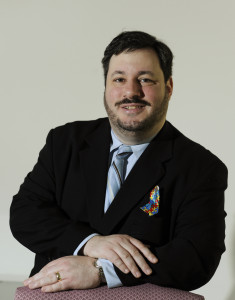We are proud to have Jeff Deutsch, founder of A SPLINT, join the Advisory Board of the Madison House Autism Foundation. The following is Desiree’s brief interview of Jeff:
Q: Why did you decide to join the advisory board of Madison House?
A: Well, first off you recruited me — and I figure anyplace that keeps you on has got to be cool!

Secondly, I figured that if you, having known me for a few years now, asked me to join I’d more likely fit in.
Finally, a great — and dedicated — bunch of people run Madison House!
Q: What do you hope to contribute as an advisory board member?
A: An Aspie perspective, among other things.
Q: Did anyone or a specific event empower you to start A SPLINT?
A: First and foremost, my (NT) wife Emily. She was the one, while we were still dating, first told me about AS, demanded I read books* and articles and inspired me to first get diagnosed and then to spread the Message: Aspies can and should learn about fitting in with the wider world at least as much as the other way around.
Also, she’s our family breadwinner, so I can build up A SPLINT. In fact, she works super-full-time while I take care of both A SPLINT and our new daughter K.D. (Kid Deutsch) — not necessarily in that order!
[*] Including by Maxine Aston, who counsels Aspie-NT couples.
Q: How has A SPLINT impacted the local and online community thus far?
A: Probably much more than I will ever see. People share A SPLINT’s and my Facebook posts, tweets, newsletter issues and other things far and wide. For example, our newsletter — on how Aspies can better relate to the rest of the world, and vice versa — is read (not just received) from California to Central Europe and from Texas to Toronto.
More directly, I’ve helped people succeed on the job and with their families…and I’ve helped spouses and other family members of Aspies better understand them.
Q: This May, you attended the Autism Housing Roundtable Madison House hosted in DC. Was there a specific issue that piqued your interest and that you will be working on with others?
A. Yes … employment. Even given how bad our economy has been for the last five or so years, Aspies *tend to be* last hired and first fired. That’s because many of us — especially males — have difficulty getting along with others, and that skill set is a requirement for any job worth thinking about.
Contrary to what many people seem to think, pretty much *nobody* can be good enough at something that it won’t matter that, say, he forgets to shower for days at a time, or stares at people (or, alternatively, never makes eye contact) and creeps them out, or says exactly what she feels like saying exactly when she feels like saying it.
Bottom line, pretty much nobody works alone. As etiquette expert (and former advertising agency owner) Peter Post — Emily Post’s great-grandson — has pointed out, no matter what you do for a living you will have to:
- Work with people with whom you otherwise might not choose to associate
- Listen and take instruction or guidance from someone with whom you don’t always agree
- Do things in a certain way, even if you don’t always believe this is the best way to do them
(And by the way, all of these apply even if you’re the CEO, you run your own business or you’re even “self-employed”. Clients [and other folks like tax and regulatory officials] can be as demanding as any boss.)
Indeed, in his own company he had three rules which, if you broke any of them, that would lead to dismissal. Two of them were about productivity. The third was: You need to be able to get along with the other people there. (For that matter, most if not all employers actually *have* that rule…few are as courteous about it as Mr. Post, who explained it in so many words to every new hire.)
More broadly, as he goes on to explain: “It’s not just about how you see yourself. Your success depends on how others see you.”
The above bullet list, company rules and quotation come from Mr. Post’s _Emily Post’s Essential Manners for Men_ (Second edition, 2012), — which I highly recommend. The specific material above can be found on pp. 176-7.
So when we want to expand employment opportunities for Aspies, that needs to include a strong focus on improving our interpersonal skills. Among other things, how to phrase issues more subtly. How to winnow out people’s true messages from their speech. How to disagree so that everyone, win or lose (or, most often, some of each) can keep working together afterwards. And so on.
[fblike layout=”standard” send=”true” action=”recommend” font=”arial” colorscheme=”light”]
Desi’s Desk is a column written periodically by Desiree Kameka, Director of Community Education & Advocacy
 Desiree Kameka is the Floridian of Madison House Autism Foundation and has been working with children and young adults on the spectrum for over 10 years. She received her Bachelor of Science degree from the University of Miami in psychology, emphasizing psychobiology, with a minor in psychological and educational studies. During her undergraduate work, she developed a program for the University of Miami Center for Autism and Related Disabilities (UM CARD), which brings together teens on the spectrum and undergraduate students to work on social and life skills through experiential learning and multidisciplinary resources. Give comments and feedback below. Desiree would love to hear from you.
Desiree Kameka is the Floridian of Madison House Autism Foundation and has been working with children and young adults on the spectrum for over 10 years. She received her Bachelor of Science degree from the University of Miami in psychology, emphasizing psychobiology, with a minor in psychological and educational studies. During her undergraduate work, she developed a program for the University of Miami Center for Autism and Related Disabilities (UM CARD), which brings together teens on the spectrum and undergraduate students to work on social and life skills through experiential learning and multidisciplinary resources. Give comments and feedback below. Desiree would love to hear from you.



 JUST IN!!! Tom Paxton to participate in World Folk Music Concert to benefit Madison House on June 1, 2013
JUST IN!!! Tom Paxton to participate in World Folk Music Concert to benefit Madison House on June 1, 2013



I would be interested in finding out when Dr Deutsch might be doing a speaking engagement ?